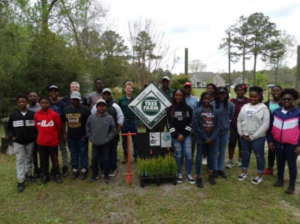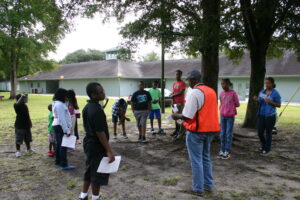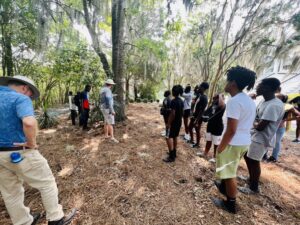Progress report for EDS23-047
Project Information
The program involves two one week summer camps and a Saturday camp held quarterly will be conducted during the grant period. In late 2018, the Center for Heirs’ Property Preservation™ (CHPP™) received a 25-acre donated tract of land in Berkeley County from Lord Berkeley Conservation Trust. The goal of CHPP™ is to utilize this land as a tangible example of how forestry may be used to dramatically increase the value of one’s land and expose rural and minority youth to sustainable forestry. This tract embodies many of the issues facing landowners in our forestry program. Consequently, this property will be an outside classroom –a demonstration forest—for landowners with whom CHPP™ works. The instructors will include the CHPP™ Forestry team, SC Forestry Commission, and USDA SC NRCS, and the teachings will mirror the conversations and technical assistance that they have with landowners. They will implement many of the approaches it often recommends to its landowners such as harvesting, planting/reforestation, and the associated benefits of longleaf pine. The minority youth will be instructed on basic forestry concepts including tree identification, forest products, forest measurements and compass/GPS to encourage their interest in careers in natural resources. These youth will be solicited from neighboring schools. Notice of these camps will be disseminated at project outreach events.
Ultimately, the youth will increase their knowledge and understanding that there are certain best management practices (BMP) which are fundamental to both high value products and healthy forests. In addition, this program will assist in establishing the youth’s role in the family landownership and their critical importance and bring awareness to the wide range of environmental career opportunities open to them. Also, these minority youth will see CHPP African American foresters on staff in action in the field, which may provide an ‘AHA” moment for some youth and provoke them to seek forestry as a career.
|
OUTPUTS & RESPONSIBLE STAFF |
OUTCOMES/RESULTS |
|
[Forestry Events Coord., Forester & Outreach Coord.] |
50 youth will increase their knowledge of sustainability forestry and natural resources Increase understanding that there are certain Best Management Practices (BMP) which are fundamental to both high value products and healthy forests 3) Establish the youth’s role in the family landownership and their critical importance 4) Bring awareness to the wide range of environmental career opportunities open to them.
|
|
Milestones for Deliverables/Subtasks |
||||||||
|
Activity |
2023 - 2024 |
2024 - 2025 |
||||||
|
|
Apr-Jun |
Jul-Sep |
Oct-Dec |
Jan-Mar |
Apr-Jun |
Jul-Sep |
Oct-Dec |
Jan-Mar |
|
Visit local schools and attend PTA meetings to make students/parents aware of the camp. |
X |
|
|
X |
|
|
|
|
|
Review applications/select students |
X |
|
|
X |
|
|
|
|
|
Prepare demonstration forest for students |
X |
|
|
X |
|
|
|
|
|
Partners meet to develop curriculum & outline program |
X |
|
|
X |
|
|
|
|
|
Finalize program curriculum. |
X |
|
|
|
X |
|
|
|
|
Secure training materials and supplies |
X |
|
|
|
X |
|
|
|
|
Conduct a one-week Forestry Camp |
X |
|
|
|
X |
|
|
|
|
Conduct field trips to other land sites |
|
X |
|
X |
|
X |
|
X |
|
Conduct 3 in-person camp sessions |
|
X |
X |
X |
|
X |
X |
X |
|
Conduct evaluation of Youth Camp with program participants |
|
X |
|
|
|
X |
|
|
|
Conduct evaluation of full project |
|
|
|
|
|
|
|
X |
|
Partners meet to review project evaluations |
|
X |
|
|
|
X |
|
|
Educational & Outreach Activities
Participation summary:
Providing education and access to information is at the core of the work of CHPP™; providing legal and forestry education and services for historically underserved landowners. The building of trust has been essential to CHPP™ success because of the long-held fear and distrust among these landowners to speak about their land. Too often, when they sought the help of the authorities or the legal system, they lost their land. Nearly every African American heirs’ property owner with whom we have worked can tell a story of land lost. To overcome the distrust and fear of these landowners, CHPP decided to work with those already trusted in the community – the pastors and local, civic leaders. With their imprimatur, CHPP™ routinely held education seminars in rural churches and community centers and gradually these landowners no longer feared that CHPP™ was trying to “get their land.” Due to this proven outreach method with our legal and forestry education, the established relationships with local community groups and leaders would be utilized in promoting the Youth Camp and encouraging the attendance of youth. CHPP™ will also utilize the Forestry team and Outreach liaisons that also have established relationships with landowners. Both teams will provide awareness of the educational opportunity for minority youth via word of mouth and at Forestry workshops, presentations, and other outreach events. The Outreach and Forestry teams will also establish relationships with area schools for recruitment of participants. CHPP™ established relationship with the SC USDA NRCS will also be beneficial in performing outreach and promoting the Youth Camp.
CHPP™ held the Young Camp July 17-21, 2023. During the week, students were exposed to many forestry areas and learned more about careers in forestry. The camp had 14 students for this session. CHPP™ staff foresters provided:
- Overview of sustainable forestry practices.
- Performing safety measures while in a forest.
- Measuring trees.
- Utilizing compasses.
- Surveying.
- Marking boundary lines.
- Taking soil samples.
The youth saw a drone demonstration and learned how to use technology, such as GIS, websites, and phone apps, as a forester. Moreover, the students were equipped with practical skills and knowledge in other land management practices, such as silviculture. They gained a deeper understanding of forest genetics and its role in cultivating faster-growing trees. The CHPP™ forestry team also shared insights on the importance of a forest management plan, a valuable tool for tree farmers to effectively manage their land.
The camp also provided unique opportunities for personal interactions and real-world exposure. A representative from the SC Forestry Commission shared insights on forest health and protection, fire prevention, and prescribed burning, and the management of insects and diseases. A representative from the SC Natural Resources Conservation Service discussed the diverse career opportunities in natural resources. The students also had the privilege of meeting a landowner, a participant in CHPP™'s sustainable forestry program. The landowner generously shared their land and the practices implemented, highlighting the benefits and advantages of tree farming, including the acquisition of new skills and the potential for generational income for families.
The students also experienced other outdoor activities, such as a nature walk at the Old Santee Canal State Park. The students also enjoyed a day at a local zoo, Bee City Zoo, and learned more about bees and bee farming.
The last day included a wrap-up of the week and a recognition/graduation ceremony led by CHPP™ CEO Dr. Jennie Stephens.
*Attached Winter 2023 newsletter (this newsletter is an annual CHPP publication. There is an article about the Youth Camp in the newsletter.
IMG_1938 3 (video)
Reporting Period 04.01.24 - 03.31.25
Project Update
During this reporting period (4/1/25 – 3/31/25), CHP continued efforts to identify organizations to partner with for camper participants. The partnership with Lowcountry Youth Services (LYS), led by ReZaun Lewis, ED, for the 2023 Young Foresters Summer Camp, unfortunately came to an end. We were informed by Mr. Lewis that LYS is no longer able to provide campers for our program.
CHP Forestry obtained two new partnerships with local community groups to host the summer 2024 Young Foresters Camp. The first group, Peter Smith Farms, in Dorchester, SC held a week-long camp that included sessions on farming and healthy food preparation. During the week of camp CHP held our youth camp for two days, July 8-9, 2024. A total of (20) youth camp participants were recruited from the local community. Campers ranged in age from pre-school to middle school. CHP Forestry and other Center staff educated youth campers about forestry and natural resources. Activities included instruction in basic forester skills such as pacing and the use of a compass, education about how trees grow, understanding soil properties, and a scavenger hunt for nature items. The second day included a walk through the working farm by Peter Smith Sr. who has been farming for most of his life.
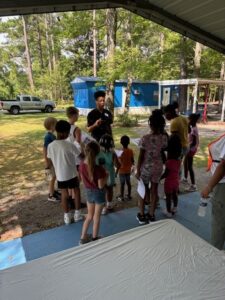
The second two-day camp was hosted by Johnny Murdaugh in Orangeburg, SC on July 24-25, 2024, with a total of (12) youth campers. The first day of camp was held at Johnny Murdaugh’s pond and included the SC Forestry Commission’s entomologist, David Jenkins, who taught the campers about insects. Campers learned basic forestry skills like tree identification, pacing, using a compass, and how trees grow. The second day included additional forestry instruction. The camp was a success.
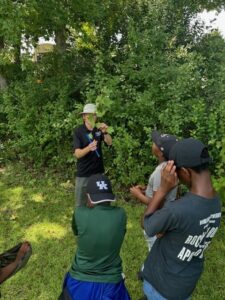
CHP reached out to Lauren Herterich (ED) of Kids on Point in Charleston, SC in February 2024, and Cane Bay High School (Berkeley County) faculty in April 2024, who currently has a natural resources program that includes forestry. Discussions of future partnerships in coordinating young forestry camps are ongoing.
Learning Outcomes
forestry
prescribed burning
technological tools for forestry- GIS, apps, drones
taking soil samples
measuring trees
Project Outcomes
The Youth Camp program introduced youth to the outdoors, exposed them to natural resources and sustainable forestry, and allowed them to learn about the wide range of environmental career opportunities open to them. After completion of the program, students shared information with their family members and others about best practices to manage land. Students learned how to measure forest biodiversity, tree diameters, identify plants, and learned about the management of forestland.
The education goals of the Youth Camp included forest health and reforestation, compass and GPS skills, and wildfire risk and prevention. Through these lessons, students reinforced their math, reading, writing, and language skills. Students learned how to measure and record forest attributes such as tree species, height and diameter, plant biodiversity, and risk of fire. These learned skills and knowledge of forestry lay a foundation for future tree farmers and healthy stewards of land and the environment. Students received a deeper appreciation for the forest and its ecosystems.
Lastly, students were given the opportunity to form relationships with CHPP™ foresters and were introduced to other professionals in natural resources such as USDA SC NRCS conservationists and foresters with the SC Forestry Commission.
Reporting Period (04.01.24 - 03.31.25)
*CHPP will now show as CHP due to rebranding.
Project Outcomes Update:
As stated in the Agreement, the initial outcomes for the Youth Foresters Camp included:
- Visit local schools and attend PTA meetings to make students/parents aware of the camp.
- Review applications/select students
Due to obtaining a partnership with Lowcountry Youth Services, CHP was able to secure 14 youth participants in the 2023 Young Foresters Camp. Therefore, CHP moved forward with these campers and did not reach out to local schools to select students.
Upcoming Plans & Remaining Outcomes
The remaining outcomes for this project included:
- Conduct 2 field trips to other land sites
- Conduct 3 in-person camp sessions
- Conduct evaluation of Youth Camp with program participants
- Conduct evaluation of full project
- Partners meet to review project evaluations.
CHP Foresters are currently in strategic planning sessions to close out the Young Foresters Camp project with a final 3-day youth camp. Discussions are taking place with potential partners, including Peter Smith and Woodlands Nature Reserve, to determine whether dates, timeframes and further logistics would be feasible for all parties. In-house discussions to finalize camp location, Agenda, materials, and possible field trip locations are also taking place. The camp is set to take place during the school year, as temperatures will be cooler for the campers to gain the full experience of the program without the challenges of discomfort due to extended exposure to rising temperatures. The opportunity to continue to work with local youth, providing forestry education, offering hands-on activities, and possibly sparking new interest in a field that many young people may not have had the opportunity to gain a deeper knowledge in is a rewarding experience for both the campers and Foresters. CHP appreciates the financial support to partner with the local community on such a project as the Young Foresters Camp.
